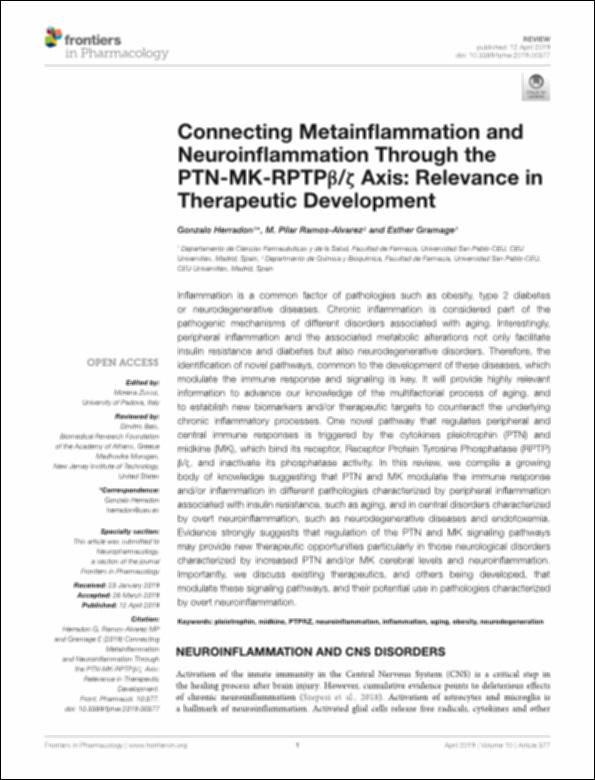Please use this identifier to cite or link to this item:
http://hdl.handle.net/10637/15211Connecting Metainflammation and Neuroinflammation Through the PTN-MK-RPTPb/z Axis: Relevance in Therapeutic Development
| Title: | Connecting Metainflammation and Neuroinflammation Through the PTN-MK-RPTPb/z Axis: Relevance in Therapeutic Development |
| Authors : | Herradón Gil-Gallardo, Gonzalo Ramos Álvarez, María del Pilar Gramage, Esther |
| Keywords: | Neurodegeneration; Obesity; Aging; Inflammation; Neuroinflammation; PTPRZ; Midkine; Pleiotrophin |
| Publisher: | Frontiers Media |
| Citation: | Herradon G, Ramos-Alvarez MP and Gramage E (2019) Connecting Metainflammation and Neuroinflammation Through the PTN-MK-RPTP / Axis: Relevance in Therapeutic Development. Front. Pharmacol. 10:377. doi: 10.3389/fphar.2019.00377 |
| Abstract: | Inflammation is a common factor of pathologies such as obesity, type 2 diabetes or neurodegenerative diseases. Chronic inflammation is considered part of the pathogenic mechanisms of different disorders associated with aging. Interestingly, peripheral inflammation and the associated metabolic alterations not only facilitate insulin resistance and diabetes but also neurodegenerative disorders. Therefore, the identification of novel pathways, common to the development of these diseases, which modulate the immune response and signaling is key. It will provide highly relevant information to advance our knowledge of the multifactorial process of aging, and to establish new biomarkers and/or therapeutic targets to counteract the underlying chronic inflammatory processes. One novel pathway that regulates peripheral and central immune responses is triggered by the cytokines pleiotrophin (PTN) and midkine (MK), which bind its receptor, Receptor Protein Tyrosine Phosphatase (RPTP) b/z, and inactivate its phosphatase activity. In this review, we compile a growing body of knowledge suggesting that PTN and MK modulate the immune response and/or inflammation in different pathologies characterized by peripheral inflammation associated with insulin resistance, such as aging, and in central disorders characterized by overt neuroinflammation, such as neurodegenerative diseases and endotoxemia. Evidence strongly suggests that regulation of the PTN and MK signaling pathways may provide new therapeutic opportunities particularly in those neurological disorders characterized by increased PTN and/or MK cerebral levels and neuroinflammation. Importantly, we discuss existing therapeutics, and others being developed, that modulate these signaling pathways, and their potential use in pathologies characterized by overt neuroinflammation. |
| URI: | http://hdl.handle.net/10637/15211 |
| Rights : | http://creativecommons.org/licenses/by/4.0/deed.es OpenAccess |
| ISSN: | 1663-9812 |
| Issue Date: | 12-Apr-2019 |
| Center : | Universidad San Pablo-CEU |
| Appears in Collections: | Facultad de Farmacia |
Items in DSpace are protected by copyright, with all rights reserved, unless otherwise indicated.


